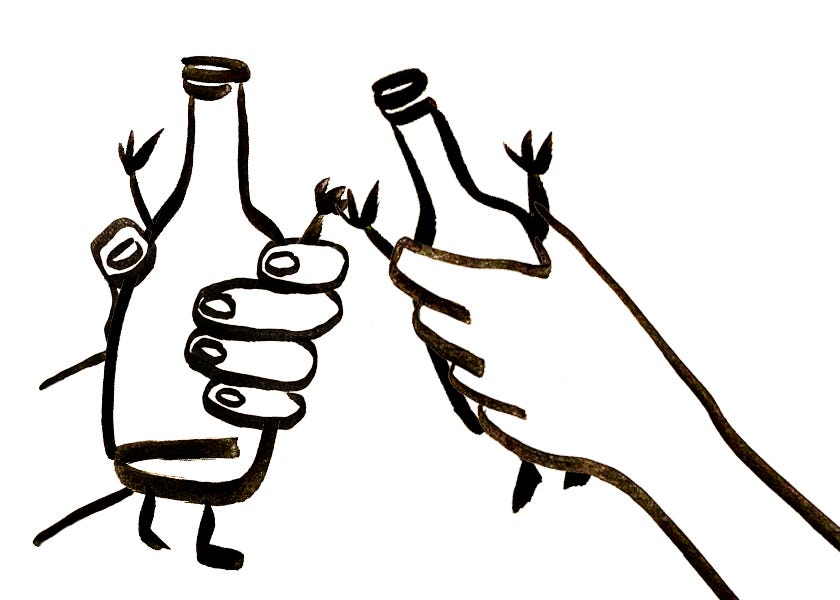If This is a Relationship Business, Then What Constitutes a Relationship?
Coming to terms with wine and spirits' most tired business trope
Selling wine and spirits is not the same as selling widgets, so we are told. Product knowledge matters. Market awareness matters. And, above all else, relationships matter.
Despite all of the supposed importance of relationships, few companies teach and train their salespeople how to cultivate them and maintain them. Nor do most companies adequately prepare their employees to recognize when a business relationship is toxic and needs to be ended.1
If relationships matter, then shouldn’t as much time be spent discussing organizational and business psychology as the Crus of Beaujolais? Shouldn’t reviews of account runs cover buyer idiosyncracies as well as sales figures? If relationships matter, then why do so few companies understand what relationships are as evidenced in the transactional way they treat employees and customers?
Three Things a Relationship Isn’t
Knowing who is in what position does not constitute a relationship. Just because you know the name of a buyer or employee doesn’t mean much.
Having a person’s contact information is not a relationship. Perhaps, before the launch of Facebook in 2004, having someone’s contact information meant that you had formed a bond with them. How else would you have their email or phone number? Today, with the ability to slide into nearly anyone’s DMs or “connect” with them via LinkedIn, a message does not equal a bond.
A sale is not a relationship. Spreadsheets don’t necessarily lie as much as they don’t tell the whole story. An account might make regular purchases without having a relationship with its salesperson.
What Exactly is a Relationship?
At a foundational level, a relationship can be understood as a “state of being connected.” The word “being” connotes that it is an active state. Implicit in the notion of connection, is the idea that two or more parties are involved.
This definition serves us as well as understanding terroir as “a sense of place.” Both are true, but nearly void of meaning for lack of elaboration. To this end, meaningful business relationships require:
the desire of both parties to want to work with one another
the ability of both parties to bring value to one another
the capacity and willingness of both parties to empathize with and trust one another
How to Cultivate a Relationship & Maintain a Relationship
Start by recognizing that not everyone is capable of forming a meaningful business relationship, and, by extension, worth doing business with. Some people won’t want to work with you. Fine. There’s no point in trying to coerce them. Some customers (or employers or employees) will be more work than they are worth. If each party doesn’t add value in their dealings with one another, the whole enterprise is moot. If you can’t trust someone or they can’t trust you, there’s little point in pursuit.
Do your best to spot red flags early on. Your proficiency in learning who not to work with will free up time to form those relationships that will be mutually beneficial and grow those that already are. How is this done?
By agreeing upon the expectations and boundaries of the relationship. When a business relationship’s rules are unspoken, assumptions are made to the detriment of both parties. From the outset, talk about and define what success looks like, how problems can be rectified when they arise, and how and how often to communicate.
By respecting the limits of your counterparty’s attention. Being tone-deaf to the realities of your partners’ other pressing issues is a surefire way of showing your disrespect, even if unintentional.
By repeatedly demonstrating empathy and building trust.
This process takes time. As Naval Ravikant has pointed out, “Compounding in business relationships is very important.” There is no shortcut in growing your reputation or people’s trust in you. If playing stupid games means winning stupid prizes, playing short-term games means giving up long-term rewards.
The best thing a salesperson can do to cultivate and maintain meaningful business relationships with their customers is to work for an organization that places customer needs over company wants. Burned bridges aren’t easily rebuilt. There is a tremendous opportunity cost to treating customers as less valuable than the sales they provide.
A socially responsible enterprise recognizes that not all dollars are of equal value. Money should be exchanged for goods and services, not one’s dignity, self-respect, or safety. When any party believes a business relationship has turned toxic, it’s time for that relationship to end. It’s not time to negotiate. The financial incentive to reconcile should not force victims to bargain with their abusers. Companies will only understand this if their employees unite in expressing that such a practice is unacceptable.


Very interesting perspective Scott! Begs the question- can digital platforms help with building, measuring and keeping the right business relationships while retaining the knowledge in the company?
We often have FB “friends” and LinkedIn “contacts” that we don’t even know. On the company level tools like CRMs are not as common in our industry as in other industries. Is this change coming?